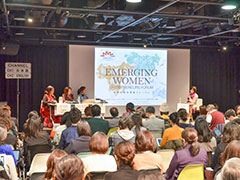Political and business figures and other opinion leaders from around the world were invited to the World Assembly for Women (WAW! 2016) held in Tokyo on Dec. 13-14, 2016. The purpose of the conference was to give international attention to policies to promote an active role for women.
JICA President Shinichi Kitaoka spoke at a high-level round table on "the Participation and Empowerment of Women in Peace and Security" held on Dec. 14. At the round table, Ms. Akiko Yamanaka, Special Ambassador of Japan for the World Tsunami Awareness Day, served as the moderator. Participants included Ms. Jeanine Hennis-Plasschaert, Minister of Defense, the Netherlands, and Ms. Melanne Verveer, Executive Director, the Georgetown Institute for Women, Peace and Security. They discussed specific policies to help women participate and play leadership roles in the area of peace and security.

At the beginning of the round table, Mr. Kitaoka explained two JICA assisted projects. One is the training program for female police officers in Afghanistan, and the other one is community development project in Bangsamoros area of Mindanao in the Philippines. Mr. Kitaoka introduced the following three lessons learned from JICA experiences that are valuable in the eyes of the international community: The first is that there is various violence directed toward women during and after conflicts and after disasters, and developing human resources in the form of police officers to deal with it, and particularly female police officers, is essential. The second is that supporting the social and economic self-reliance of a community's women in poverty is effective in stabilizing a society thrown into confusion by the recovery process after a conflict or disaster. The third is that it is important to incorporate the suggestions of a wider range of stakeholders, including women, during efforts to establish disaster risk reduction plans and reestablish stable societies. Also, in carrying out these initiatives, he said, it is important for society as a whole, including men, to improve our awareness and understanding of women's role. Finally, he said that whether in normal times or in times of difficulty, JICA will continue providing assistance to achieve gender equality and women's empowerment in developing countries.
A summary of the outcome of the high level round table and suggestions were shared at the final overall meeting. Regarding "Participation and Empowerment of Women in Peace and Security," at which Mr. Kitaoka spoke, it was reported that to reduce risk during conflicts and disaster risk, the abilities of women in the community with knowledge and experience, who best understand the needs of women and girls, are the most effective, and that women may play a key role, particularly in preventing conflict.
Based on the "Development Strategy for Gender Equality and Women’s Empowerment” announced by the Japanese Government ahead of the G7 Ise-Shima Summit, JICA will take further measures to achieve concrete results in the area of gender equality and women's empowerment, which it sees as a top priority development issue.




scroll